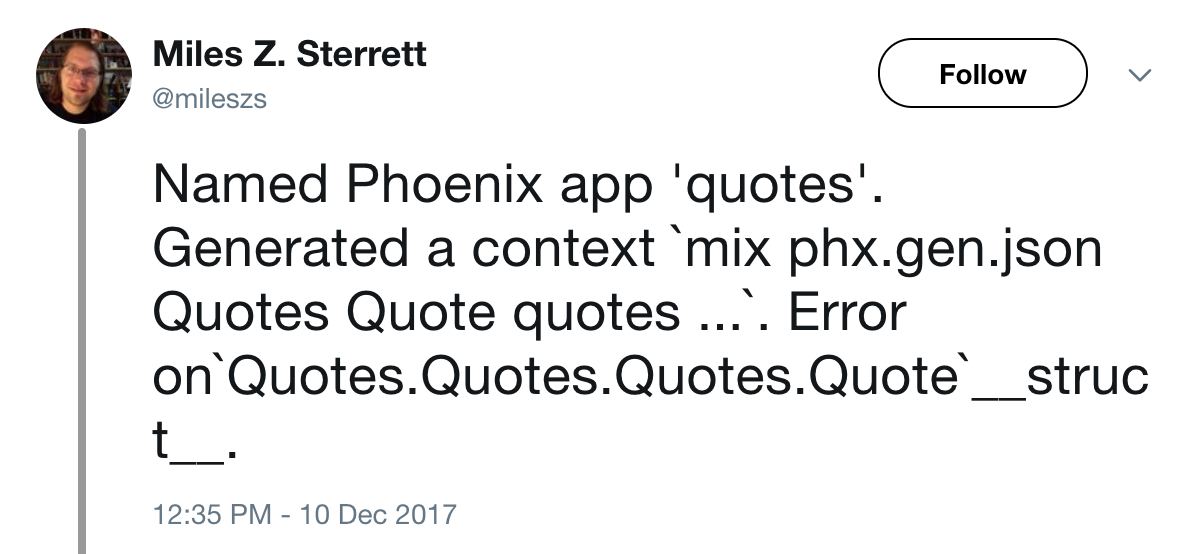class: center, middle  # Contextualizing <br>Phoenix Contexts ### Steve Grossi @ Lessonly --- .right.third[  .caption[A puggle (it’ll make sense later)] ] ## Summary 1. What are “Contexts”? 2. Why the change? 3. Why not? 4. Using Contexts 5. Migrating to Contexts --- ## What Are Contexts? --- ## What Are Contexts Not? --- ## What Are Contexts Not? They’re not a new idea, even in Elixir: > Contexts are dedicated modules that expose and group related functionality. For example, anytime you call Elixir’s standard library, be it `Logger.info/1` or `Stream.map/2`, you are accessing different contexts. Internally, Elixir’s logger is made of multiple modules, such as `Logger.Config` and `Logger.Backends`, but we never interact with those modules directly. *We call the `Logger` module the context, exactly because it exposes and groups all of the logging functionality.* —<https://hexdocs.pm/phoenix/contexts.html> --- ## What Are Contexts Not? They’re not required unless you use the generators: ```elixir # Phoenix 1.2 mix phx.gen.html CreditCard credit_cards number:string # Phoenix 1.3 👇 mix phx.gen.html Payments CreditCard credit_cards number:string ``` (But you should use them anyway!) --- ## What Are Contexts Not? They’re not code or magic, just modules and functions. ```elixir # mix phx.gen.context Payments CreditCard credit_cards number:string defmodule Puggle.Payments do @moduledoc """ The Payments context. """ @doc """ Returns the list of credit_cards. ## Examples iex> Payments.list_credit_cards() [%CreditCard{}, ...] """ def list_credit_cards do Repo.all(CreditCard) end ``` --- ## What Are Contexts? An interface layer: ```elixir # Phoenix 1.2: Controller -> Repo def show(conn, %{"id" => id}) do user = Repo.get!(User, id) render(conn, "show.html", user: user) end ``` ```elixir # Phoenix 1.3: Controller -> Context -> Repo def show(conn, %{"id" => id}) do user = Accounts.get_user!(id) render(conn, "show.html", user: user) end # Context module defmodule Accounts to def get_user!(id), do: Repo.get!(User, id) end ``` --- class: center, middle # Why The Change? --- ## Why? Avoids Duplication ```elixir # Phoenix 1.2 defmodule PuggleWeb.UserController do def create(conn, %{"user" => user_params}) do changeset = User.changeset(%User{}, user_params) {:ok, user} = Repo.insert(changeset) Puggle.Email.welcome_email(user.email) |> Mailer.deliver_now Intercom.add_user(user) conn |> put_flash(:info, "User created successfully.") |> redirect(to: user_path(conn, :index)) end defmodule PuggleWeb.API.V1.UserController do def create(conn, %{"user" => user_params}) do changeset = User.changeset(%User{}, user_params) {:ok, user} = Repo.insert(changeset) Puggle.Email.welcome_email(user.email) |> Mailer.deliver_now Intercom.add_user(user) render conn, "show.json", user: user end ``` --- ## Why? Avoids Duplication ```elixir # Phoenix 1.3 defmodule PuggleWeb.UserController do def create(conn, %{"user" => user_params}) do {:ok, _user} = Accounts.create_user(user_params) conn |> put_flash(:info, "User created successfully.") |> redirect(to: user_path(conn, :index)) end defmodule PuggleWeb.API.V1.UserController do def create(conn, %{"user" => user_params}) do {:ok, user} = Accounts.create_user(user_params) render conn, "show.json", user: user end defmodule Puggle.Accounts do def create_user(user_params) do changeset = User.changeset(%User{}, user_params) {:ok, user} = Repo.insert(changeset) Puggle.Email.welcome_email(user.email) |> Mailer.deliver_now Intercom.add_user(user) {:ok, user} end ``` --- ## Why? Console Convenience! ```elixir iex> Accounts.create_user(%{name: "Steve"}) iex> # vs. iex> Repo.insert(User.changeset(%User{}, %{name: "Steve"})) ``` --- ## Why? Keep Related Code Together ```sh # Phoenix 1.2 web/ models/ company.ex # Ecto schema # ... user.ex # Ecto schema lib/ sync_account_service.ex ``` ```sh # Phoenix 1.3 lib/ puggle/ accounts/ accounts.ex # The context company.ex # Ecto schema user.ex # Ecto schema sync_account_service.ex # other related files ``` --- ## Why? Elixir Conventions Phoenix 1.2: ```sh lib/ # Where most Elixir apps put their code web/ # Where Phoenix 1.2 puts your code ``` Phoenix 1.3: ```sh lib/ my_app/ # your business logic my_app_web/ # HTTP stuff (e.g. controllers) ``` --- ## Why? Phoenix Is Not Your App > “Phoenix is not your application” —[Lance Halvorsen](https://www.youtube.com/watch?v=lDKCSheBc-8) Phoenix 1.2: ```sh web/ # Phoenix stuff models/ # Oh, hey, Business Logic 👋 controllers/ # HTTP views/ # HTTP endpoint.ex # HTTP ``` Phoenix 1.3: ```sh lib/ my_app/ # Business logic my_app_web/ # Phoenix/HTTP stuff ``` --- ## Why? “Ubiquitous Language” .right.third[] - From *Domain-Driven Design* (2003) by Eric Evans - A common language between developers, end users, and the business folks in between ```elixir Orders.ship_order(order_id) # vs. %ShipmentRequest{order_id: order_id} |> ShipmentRequest.changeset() |> Repo.insert() ``` --- ## Why? A Path to Service Extraction ```sh # Payments Context puggle/ lib/ puggle/ payments/ ``` ```sh # Payments umbrella app puggle/ apps/ core/ payments/ ``` ```sh # separate Payments service puggle/ puggle_payments/ # own project! lib/ puggle/ puggle_web/ ``` --- ## Why? Easier to Test ```elixir # Controller test test "lists all users", %{conn: conn} do conn = get conn, user_path(conn, :index) assert html_response(conn, 200) =~ "Listing Users" end # Context test test "list_users/0 returns all users" do user = user_fixture() assert Accounts.list_users() == [user] end ``` Possibility for redundant coverage, though. --- ## Why? Separate Ecto Schemas ```elixir defmodule Puggle.Owners.Dog do schema "dogs" do belongs_to :owner, Puggle.Owners.Owner field :name, :string field :good_dog, :boolean # Admin-only info timestamps() end end owner |> Ecto.assoc(:dogs) |> Repo.all |> Poison.encode! # {name: "Fido", good_dog: false} 😡 # Whoops, sorry! ``` --- ## Why? Separate Ecto Schemas ```elixir defmodule Puggle.Owners.Dog do schema "dogs" do belongs_to :owner, Puggle.Owners.Owner field :name, :string timestamps() end end defmodule Puggle.Admin.Owners.Dog do schema "dogs" do belongs_to :owner, Puggle.Owners.Owner field :name, :string field :good_dog, :boolean timestamps() end end ``` --- ## Why Not? ```sh mix phx.gen.context Ummmm ``` A little more thinking up front (But it’s easy to change your mind!) > If you’re stuck when trying to come up with a context name when the grouped functionality in your system isn’t yet clear, you can simply use the plural form of the resource you’re creating...As you grow your application and the parts of your system become clear, you can simply rename the context to a more refined name at a later time. > > — [the docs](https://hexdocs.pm/phoenix/contexts.html) --- ## Why Not? More naming = more potential for [naming collisions](https://twitter.com/mileszs/status/939956746096971776)  --- class: center, middle # Using Contexts --- ## Using Contexts Examples: ```elixir # Contexts + HTML stuff like Controllers and templates mix phx.gen.html Accounts User users name:string email:string # Context + API stuff like Controller with JSON output mix phx.gen.json Blog Post posts title:string body:text # Just a context, no web stuff mix phx.gen.context Blog Author authors name:string ``` > "If you are unsure, you should prefer explicit modules (contexts) between resources." > > — [the docs](https://hexdocs.pm/phoenix/contexts.html) --- ## References - https://hexdocs.pm/phoenix/contexts.html - Keynote: https://m.youtube.com/watch?v=tMO28ar0lW8 - http://michal.muskala.eu/2017/05/16/putting-contexts-in-context.html - https://elixirforum.com/t/how-would-you-explain-phoenix-contexts-to-a-newbie/5947/10 - https://elixirforum.com/t/phoenix-contexts-learning-resources/5930 - https://robots.thoughtbot.com/lessons-from-using-phoenix-1-3